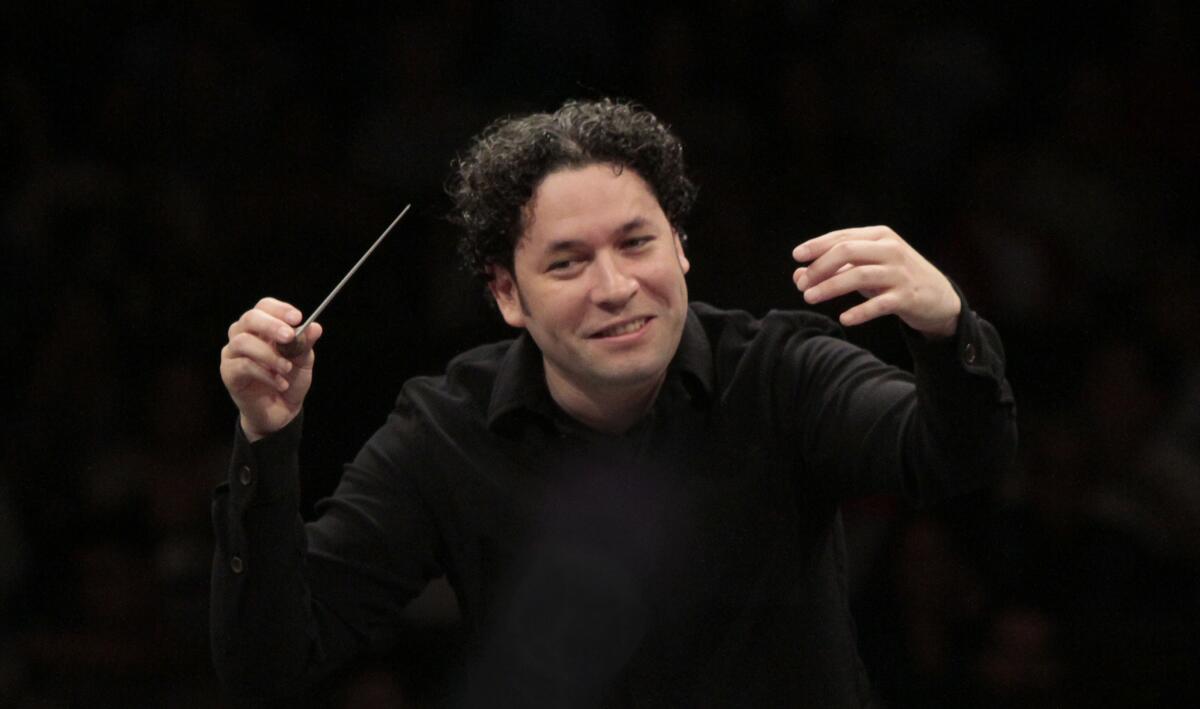Review: Gustavo Dudamel leads an embracing performance in Vienna

- Share via
Reporting from VIENNA — Gustavo Dudamel conducted the Vienna Philharmonic on Wednesday night in a glorious performance of Rimsky-Korsakov’s “Scheherazade” to open the 2014-15 season at the Theater an der Wien, built in 1801 and the site of many Beethoven premieres.
The cream content in the playing was rich enough to satisfy Viennese demands for high caloric content. The instrumental colors were up to the golden standard of Gustav Klimt’s glitteringly golden paintings in the Secession, just up the block. The normally haughty-seeming players in this most elite of orchestras were all smiles and, heaven forbid, even hugs. The audience, which can be sniffy in Vienna, was foot-stompingly effusive in its response. Smiles all around.
Another night, another major opening or closing. Dudamel is busy chalking up five of them during the last month of summer alone.
He closed the Baltic Sea Festival (which Esa-Pekka Salonen helped found in Stockholm) with children from the El Sistema-inspired program Dudamel has begun in Sweden and with a performance of Sibelius’ Second Symphony featuring the Gothenburg Symphony. He opened the Berlin Festival in a gala concert with the Berlin Staatskapelle that featured Daniel Barenboim as soloist in both Brahms piano concertos (recorded live for future release).
Dudamel then went on to conduct the Vienna Philharmonic in a concert climaxing the popular outdoor festival in Grafenegg, a once-royal retreat outside Vienna. And now, in the time before his sixth Los Angeles season-opening gala in Walt Disney Concert Hall at the end of the month, Dudamel has embarked on a 16-day tour with the Vienna Philharmonic that includes opening a new concert hall in Shanghai.
Dudamel’s draw grows apace. So too does his bonding with the Vienna Philharmonic. The orchestra does not have a music director. The players, who are the crème de la crème of the larger orchestra at the Vienna State Opera, run the Philharmonic themselves. They choose the guest conductors, and they are fussy.
The Theater an der Wien, which is not the orchestra’s regular hall, is very intimate, the 1,400 seats crammed into a remarkably small space and offering less legroom than economy seats on the cheesiest commuter flights. In the third row, I felt practically on the stage with the musicians. It was not the best seat for judging the overall balance of the orchestra, but it was an excellent place to observe Dudamel’s interaction with the players.
The program was all Rimsky-Korsakov, the first half devoted to the Russian composer’s brightly convivial Russian Easter Festival Overture and his orchestration of Mussorgsky’s anxious “Night on Bald Mountain,” with “Scheherazade” after intermission. All are works Dudamel has yet to conduct with the L.A. Phil, the Russian Easter a score he hadn’t done since he was 15.
Dudamel began low-keyed. He encouraged no extra vibrancy in the overture and let the drama on “Bald Mountain” speak for itself, trusting impeccable playing to speak for itself and for Rimsky-Korsakov. This was Dudamel’s first time in the hall, and he may also have been taking time to let its history sink in.
In “Scheherazade,” something special happened. Dudamel did not stint on musical storytelling, whether creating an atmosphere of wonder simply through a magical blending of winds or portraying the assertive sultan with pompously golden Viennese brass or coaxing convincingly erotic sensuality to represent the seductive Scheherazade’s power of persuasion over the sultan.
The score is opulent, and the Vienna Philharmonic has the most opulent sound of any orchestra. But it was the instrumental solos that set this “Scheherazade” apart. Dudamel invited individuality, and no more so than in the many gorgeous violin solos (the concertmaster was not identified in the program).
At the same time, this was an arrestingly resolute and unified performance of a piece that can easily seem to wander. In trusting the musicians, Dudamel clearly inspired their trust, with individual will made to serve a noble purpose.
It was a performance that, in fact, became uniquely true to the spirit of the Theater an der Wien. It was here where Beethoven became the first composer to boldly exhort the rights of the individual, here where he first presented his “Eroica” and his Fifth Symphony, where he first staged “Fidelio.”
And eccentric independence appears to be a tradition still present in this hall. Some opening nights in Vienna are ever formal. Not this one, in which dress was varied. One older gentleman arrived in T-shirt, pajama bottoms and sneakers.
Unlike with Beethoven, political ideals in Rimsky-Korsakov’s picturesque Russian score remain under the surface. But in this tale, a Middle Eastern terrorist is kept at bay not through violence but a woman’s talk.
On Wednesday, democracy rose above the surface without disturbing a beautifully alluring surface. And the evening ended in unity, with musicians hugging.
It was a great performance and one meant to open more than just a famed concert hall’s season. It was meant to open minds.
Twitter: @markswed
More to Read
The biggest entertainment stories
Get our big stories about Hollywood, film, television, music, arts, culture and more right in your inbox as soon as they publish.
You may occasionally receive promotional content from the Los Angeles Times.











